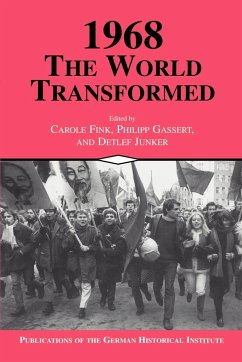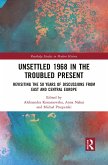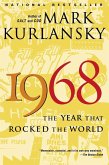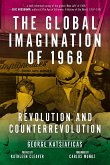S. Mattern (Associate ed.)
1968
The World Transformed
Herausgeber: Fink, Carole; Junker, Detlef; Gassert, Philipp
S. Mattern (Associate ed.)
1968
The World Transformed
Herausgeber: Fink, Carole; Junker, Detlef; Gassert, Philipp
- Broschiertes Buch
- Merkliste
- Auf die Merkliste
- Bewerten Bewerten
- Teilen
- Produkt teilen
- Produkterinnerung
- Produkterinnerung
1968: The World Transformed provides an international perspective on the most tumultuous year of the Cold War.
Andere Kunden interessierten sich auch für
![1968 1968]() Richard Vinen196817,99 €
Richard Vinen196817,99 €![The Dutch and German Communist Left (1900-1968) The Dutch and German Communist Left (1900-1968)]() Philippe BourrinetThe Dutch and German Communist Left (1900-1968)71,99 €
Philippe BourrinetThe Dutch and German Communist Left (1900-1968)71,99 €![The Prague Spring and the Warsaw Pact Invasion of Czechoslovakia in 1968 The Prague Spring and the Warsaw Pact Invasion of Czechoslovakia in 1968]() The Prague Spring and the Warsaw Pact Invasion of Czechoslovakia in 196895,99 €
The Prague Spring and the Warsaw Pact Invasion of Czechoslovakia in 196895,99 €![Unsettled 1968 in the Troubled Present Unsettled 1968 in the Troubled Present]() Unsettled 1968 in the Troubled Present65,99 €
Unsettled 1968 in the Troubled Present65,99 €![1968 1968]() Mark Kurlansky196817,99 €
Mark Kurlansky196817,99 €![Global Imagination of 1968 Global Imagination of 1968]() George KatsiaficasGlobal Imagination of 196822,99 €
George KatsiaficasGlobal Imagination of 196822,99 €![The Catholic Church and the Northern Ireland Troubles, 1968-1998 The Catholic Church and the Northern Ireland Troubles, 1968-1998]() Margaret M ScullThe Catholic Church and the Northern Ireland Troubles, 1968-199854,99 €
Margaret M ScullThe Catholic Church and the Northern Ireland Troubles, 1968-199854,99 €-
-
-
1968: The World Transformed provides an international perspective on the most tumultuous year of the Cold War.
Hinweis: Dieser Artikel kann nur an eine deutsche Lieferadresse ausgeliefert werden.
Hinweis: Dieser Artikel kann nur an eine deutsche Lieferadresse ausgeliefert werden.
Produktdetails
- Produktdetails
- Verlag: Cambridge University Press
- Seitenzahl: 504
- Erscheinungstermin: 10. April 2003
- Englisch
- Abmessung: 229mm x 152mm x 29mm
- Gewicht: 810g
- ISBN-13: 9780521646376
- ISBN-10: 0521646375
- Artikelnr.: 21996023
- Herstellerkennzeichnung
- Books on Demand GmbH
- In de Tarpen 42
- 22848 Norderstedt
- info@bod.de
- 040 53433511
- Verlag: Cambridge University Press
- Seitenzahl: 504
- Erscheinungstermin: 10. April 2003
- Englisch
- Abmessung: 229mm x 152mm x 29mm
- Gewicht: 810g
- ISBN-13: 9780521646376
- ISBN-10: 0521646375
- Artikelnr.: 21996023
- Herstellerkennzeichnung
- Books on Demand GmbH
- In de Tarpen 42
- 22848 Norderstedt
- info@bod.de
- 040 53433511
Introduction Carole Fink, Philipp Gassert and Detlef Junker; Part I. Tet
and Prague: The Bipolar System in Crisis: 1. Tet and the Crisis of Hegemony
George C. Herring; 2. Tet on TV: American nightly news reporting Chester J.
Pach Jr; 3; The American economic consequences of 1968 Diane B. Kunz; 4.The
Czechoslovak crisis and the Brezhnev doctrine Mark Kramer; 5. Ostpolitik:
the role of the Federal Republic of Germany in the process of Détente
Gottfried Niehart; 6. China under siege: escaping the dangers of 1968 Nancy
B. Tucker; Part II. From Chicago to Beijing: Challenges to the Domestic
Order: 7. 1968 and the unraveling of liberal America Alan Brinkley; 8.
March 1968 in Poland Jerzy Eisler; 9. May 1968 in France: the rise and fall
of a new social movement Ingrid Gilcher-Holtey; 10. A laboratory of
post-industrial society: reassessing the 1960s in Germany Claus Leggewie;
11. The Third World Arif Dirlik; Part III. Ask the Impossible!: Protest
Movements of 1968: 12. The revolt against the establishment: students
versus the press in West Germany and Italy Stuart J. Hilwig; 13. The
changing nature of the European working class: the rise and fall of the
'new middle classes' (France, Italy, Spain, Czechoslovakia) Gerd Rainer
Horn; 14. The women's movement in East and West Germany Eva Maleck-Lewy and
Bernhard Maleck; 15. 1968: a turning point in American Race Relations?
Manfred Berg; 16. The revival of Holocaust awareness in West Germany,
Israel, and the United States Harold Marcuse; 17. The nuclear threat
ignored: how and why the campaign against the bomb disintegrated in the
late 1960s Lawrence Wittner; Part IV. Epilogue: 18. 1968 and 1989:
caesuras, comparisons, and connections Konrad H. Jarausch.
and Prague: The Bipolar System in Crisis: 1. Tet and the Crisis of Hegemony
George C. Herring; 2. Tet on TV: American nightly news reporting Chester J.
Pach Jr; 3; The American economic consequences of 1968 Diane B. Kunz; 4.The
Czechoslovak crisis and the Brezhnev doctrine Mark Kramer; 5. Ostpolitik:
the role of the Federal Republic of Germany in the process of Détente
Gottfried Niehart; 6. China under siege: escaping the dangers of 1968 Nancy
B. Tucker; Part II. From Chicago to Beijing: Challenges to the Domestic
Order: 7. 1968 and the unraveling of liberal America Alan Brinkley; 8.
March 1968 in Poland Jerzy Eisler; 9. May 1968 in France: the rise and fall
of a new social movement Ingrid Gilcher-Holtey; 10. A laboratory of
post-industrial society: reassessing the 1960s in Germany Claus Leggewie;
11. The Third World Arif Dirlik; Part III. Ask the Impossible!: Protest
Movements of 1968: 12. The revolt against the establishment: students
versus the press in West Germany and Italy Stuart J. Hilwig; 13. The
changing nature of the European working class: the rise and fall of the
'new middle classes' (France, Italy, Spain, Czechoslovakia) Gerd Rainer
Horn; 14. The women's movement in East and West Germany Eva Maleck-Lewy and
Bernhard Maleck; 15. 1968: a turning point in American Race Relations?
Manfred Berg; 16. The revival of Holocaust awareness in West Germany,
Israel, and the United States Harold Marcuse; 17. The nuclear threat
ignored: how and why the campaign against the bomb disintegrated in the
late 1960s Lawrence Wittner; Part IV. Epilogue: 18. 1968 and 1989:
caesuras, comparisons, and connections Konrad H. Jarausch.
Introduction Carole Fink, Philipp Gassert and Detlef Junker; Part I. Tet
and Prague: The Bipolar System in Crisis: 1. Tet and the Crisis of Hegemony
George C. Herring; 2. Tet on TV: American nightly news reporting Chester J.
Pach Jr; 3; The American economic consequences of 1968 Diane B. Kunz; 4.The
Czechoslovak crisis and the Brezhnev doctrine Mark Kramer; 5. Ostpolitik:
the role of the Federal Republic of Germany in the process of Détente
Gottfried Niehart; 6. China under siege: escaping the dangers of 1968 Nancy
B. Tucker; Part II. From Chicago to Beijing: Challenges to the Domestic
Order: 7. 1968 and the unraveling of liberal America Alan Brinkley; 8.
March 1968 in Poland Jerzy Eisler; 9. May 1968 in France: the rise and fall
of a new social movement Ingrid Gilcher-Holtey; 10. A laboratory of
post-industrial society: reassessing the 1960s in Germany Claus Leggewie;
11. The Third World Arif Dirlik; Part III. Ask the Impossible!: Protest
Movements of 1968: 12. The revolt against the establishment: students
versus the press in West Germany and Italy Stuart J. Hilwig; 13. The
changing nature of the European working class: the rise and fall of the
'new middle classes' (France, Italy, Spain, Czechoslovakia) Gerd Rainer
Horn; 14. The women's movement in East and West Germany Eva Maleck-Lewy and
Bernhard Maleck; 15. 1968: a turning point in American Race Relations?
Manfred Berg; 16. The revival of Holocaust awareness in West Germany,
Israel, and the United States Harold Marcuse; 17. The nuclear threat
ignored: how and why the campaign against the bomb disintegrated in the
late 1960s Lawrence Wittner; Part IV. Epilogue: 18. 1968 and 1989:
caesuras, comparisons, and connections Konrad H. Jarausch.
and Prague: The Bipolar System in Crisis: 1. Tet and the Crisis of Hegemony
George C. Herring; 2. Tet on TV: American nightly news reporting Chester J.
Pach Jr; 3; The American economic consequences of 1968 Diane B. Kunz; 4.The
Czechoslovak crisis and the Brezhnev doctrine Mark Kramer; 5. Ostpolitik:
the role of the Federal Republic of Germany in the process of Détente
Gottfried Niehart; 6. China under siege: escaping the dangers of 1968 Nancy
B. Tucker; Part II. From Chicago to Beijing: Challenges to the Domestic
Order: 7. 1968 and the unraveling of liberal America Alan Brinkley; 8.
March 1968 in Poland Jerzy Eisler; 9. May 1968 in France: the rise and fall
of a new social movement Ingrid Gilcher-Holtey; 10. A laboratory of
post-industrial society: reassessing the 1960s in Germany Claus Leggewie;
11. The Third World Arif Dirlik; Part III. Ask the Impossible!: Protest
Movements of 1968: 12. The revolt against the establishment: students
versus the press in West Germany and Italy Stuart J. Hilwig; 13. The
changing nature of the European working class: the rise and fall of the
'new middle classes' (France, Italy, Spain, Czechoslovakia) Gerd Rainer
Horn; 14. The women's movement in East and West Germany Eva Maleck-Lewy and
Bernhard Maleck; 15. 1968: a turning point in American Race Relations?
Manfred Berg; 16. The revival of Holocaust awareness in West Germany,
Israel, and the United States Harold Marcuse; 17. The nuclear threat
ignored: how and why the campaign against the bomb disintegrated in the
late 1960s Lawrence Wittner; Part IV. Epilogue: 18. 1968 and 1989:
caesuras, comparisons, and connections Konrad H. Jarausch.








